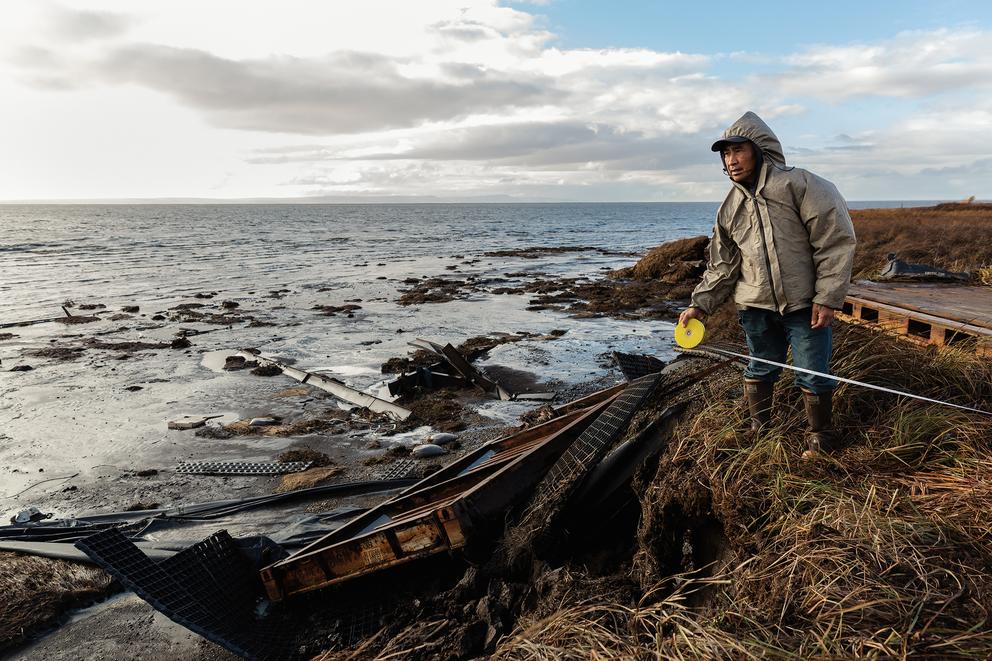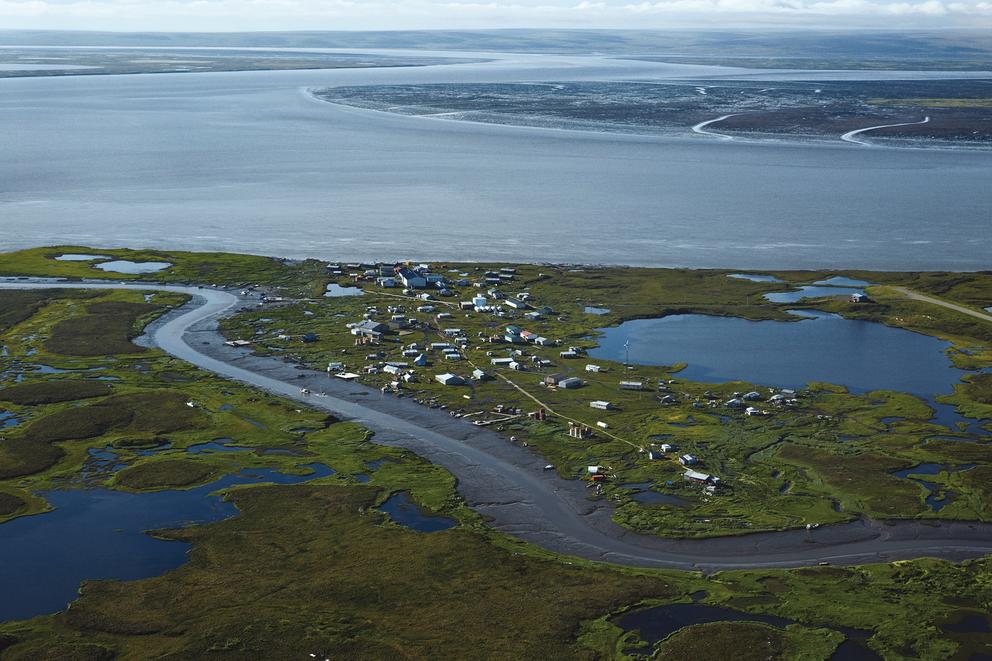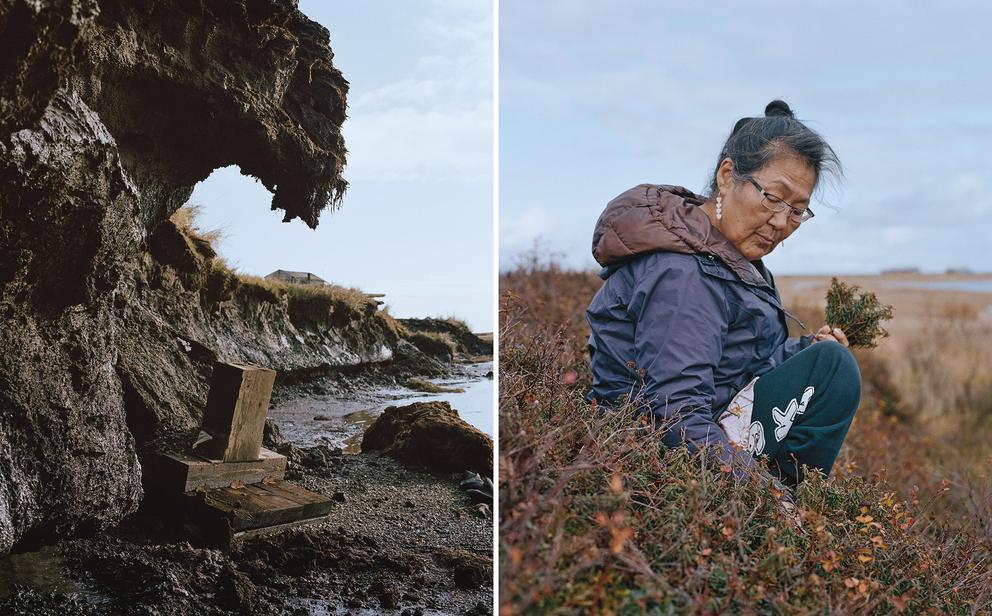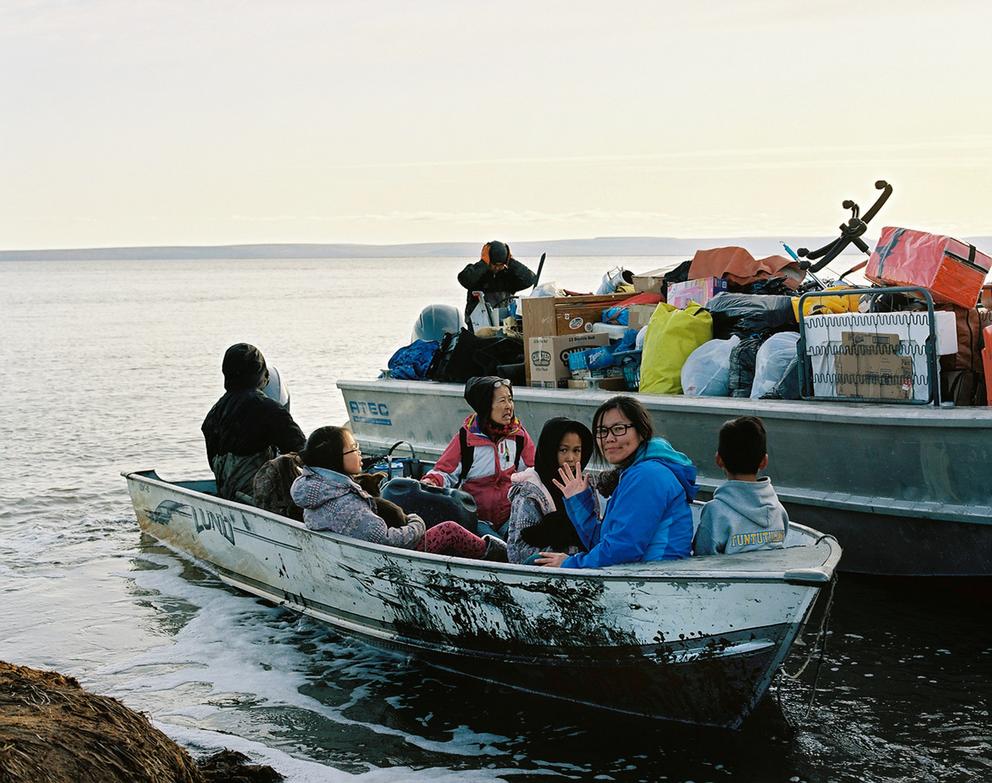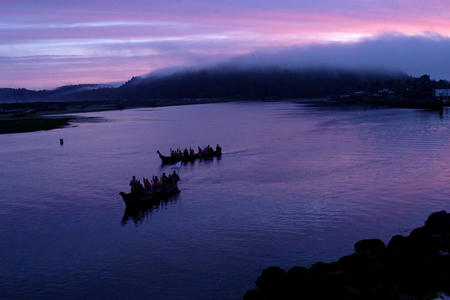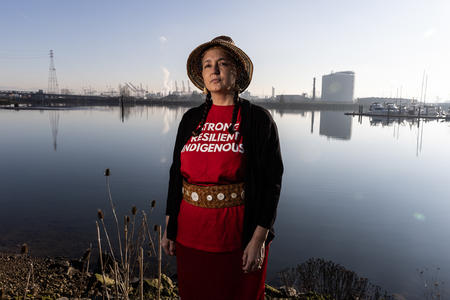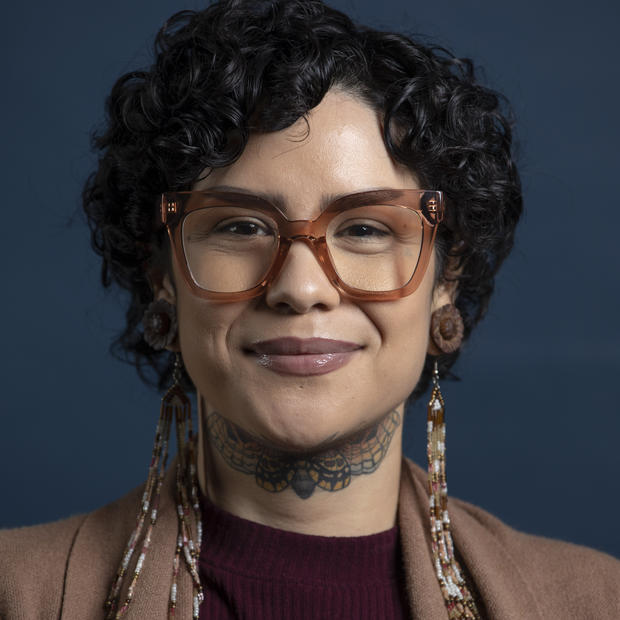The Hoh, Makah, Quileute tribes and the Quinault Indian Nation have stewarded the lands on the Olympic Peninsula since time immemorial. But these communities are losing what ancestral lands they have left to climate change, seen in the eroding coastline and rising sea levels. Their reservation lands now face yearly flooding, something these tribes used to experience once every decade. Crosscut’s 2019 documentary, The Rising, spotlighted Quinault leaders’ efforts to relocate the villages of Taholah and Queets from their homelands, where over a thousand people face increased tsunami risk as the sea rises inch by inch, year by year.
In Central Washington, the Colville Tribes are dealing with deadlier fire seasons than ever before. “The fire burned so hot in some spots that it burned the dirt,” Monique Bourgeau, a Colville teacher of the nxelscin dialect of Salish, told Crosscut.
Bourgeau recalls seeing the massive flames coming toward her home where her mother was sleeping and seeing panicked birds flying all over. “We are bound by natural law,” Bourgeau said. “Whatever happens in the land happens to us. We will be the first to feel the effects of it.”
Those effects, Bourgeau said, are signs we should be listening to. The Intergovernmental Panel on Climate Change’s latest report supported her sentiments. If there’s any delay in global action to confront the climate crisis, we will “miss a brief and rapidly closing window of opportunity to secure a liveable and sustainable future for all,” the report stated.
We are all related here
On Earth Day, the documentary film Newtok, premiered to the public, raising awareness about potential climate refugees, the Yup’ik people of an Alaskan village called Newtok. Within minutes of watching the film, audiences can see that the infrastructure of Newtok is sinking into the mud, a scene familiar for some Washington coastal tribes.
The permafrost beneath the village used to be stable year-round, but it isn't freezing up in the winters as it used to. As the Earth has warmed, the ground has thawed, becoming marshy, unstable and unsafe.
Traditionally, the Yup’ik people were nomadic and would follow the seasons to fish, pick berries and hunt across the land surrounding Newtok. In 1958, the Bureau of Indian Affairs forced the Yup’ik people to leave the summer village of Kayalavik and put their children in a government-run school in Newtok or be thrown in jail. Just 25 years later, the melting permafrost began threatening the village of Newtok and the life that the Yup’ik people had created there.
Over the past 50 years, temperatures have warmed across Alaska at twice the rate of the rest of the world. The Newtok shoreline is eroding at the pace of about 70 to 90 feet a year. “We were very interested in telling a story that's happening in the United States to American citizens and something that is happening now,” documentary photographer and filmmaker, and Seattleite Andrew Burton told Crosscut.
Over six years, Marie Meade, a Yup’ik humanities scholar, language expert, educator and tradition bearer; Michael Kirby Smith, a filmmaker and photographer; and Burton spent more than 300 days documenting the impact of the climate crisis on Yup’ik people and their efforts to secure federal aid to move to safer ground 10 miles away in Mertarvik. In doing so, the trio spotlighted the tribe’s traditions, as well as their resilience.
“When it did start to feel real for me is when I was watching our land get washed away and it was right next door,” Cuk’ayak, or Della Carl, a single mother of three explains during the film. “Every time land broke off I could hear it.”
Indigenous ways of knowing
Della’s home was demolished because of the dangers of the eroding shoreline nearing her home. She moved in with her father, Cimiugaq, or George Carl, a village council member, but his home was eventually torn down for the same reason.
In 2019, Newtok leaders were granted $15 million in federal aid to move one-third of their people into new homes in Mertarvik. “I am hopeful that they will complete the relocation, but will it be as quick as it needs to be? That remains to be seen,” Burton said. “The community is now being forced through this horrifically tragic, traumatic event, where families are ripped apart.”
The delay in reuniting the Yup’ik people in Newtok with their community in Mertarvik has only compounded the pain of losing their ancestral lands. The Yup’ik people of Newtok, like all Indigenous people, carry with them the ancestral knowledge of the land. It is inextricably tied to cultural heritage and has been called Traditional Ecological Knowledge, Indigenous ways of knowing, or, simply, Native science.
“This knowledge was acquired through observation, experience, hypothesis and testing, the same as any other knowledge, except that it was done by Indian people,” Bryan Newland, assistant secretary of the Interior Department for Indian affairs, told Crosscut. “Rather than being documented in peer reviewed journals, it was put into story so it can be passed down from generation to generation. It is legitimate and valuable scientific knowledge that was acquired over generations.”
Through tribal knowledge of the history of a place, Indigenous people see changes in landscapes and ecosystems that can help communities understand the place where they live and what it takes to manage it, and live with it effectively, Newland said.
“The community of Newtok is so in tune with the landscape that they live on and the ecosystem they are within and surviving off,” said Smith, filmmaker. He said his time in Newtok made him more aware of the local environment — the animals, seasons, and plants — in a more visceral, tangible way.
Western colonial scientific communities began to pay some attention to Native science in recent years, but this knowledge isn’t always taken seriously. The Yup’ik people of Newtok have been stewarding their land and attempting to share that knowledge and their concerns with government officials like U.S. Rep. Don Young of the Alaska delegation.
Preserving traditional ways of life
In the film, village relocation coordinator Romy Cadiente meets with Young to explain that the water is maybe 15 feet away from Councilmember Carl’s window. Young’s reply: "You know how to swim?"
Not one tribal member laughed.
“It was a horrible, insensitive thing to say, and it felt like they were not really listened to or taken seriously,” Smith said. “We included that scene in the film because it's representative of the way the government has treated Newtok and anyone that disagrees with me, I would politely invite them to show me if the community has moved or not.”
Tribes in what is now Washington state have been raising these same issues for decades — and their pleas are becoming increasingly urgent. The sea level is projected to rise up to a foot in the next 30 years, which is expected to intensify coastal flooding 10 times as much as it occurs today, according to a February report by the National Oceanic and Atmospheric Administration.
More than safety or a seat at the proverbial table, climate change is impacting Indigenous tradition and tribal way of life. The Yup’ik people of Newtok rely on their ancestral hunting grounds for 95% of their diet, which includes fish and birds, among other animals. There are more berries and more edible plants that grow on Newtok than in Mertarvik.
Mertarvik is on higher rocky ground with mountains, where less of these traditional foods live and grow. Meade, the Yup’ik scholar, said those who have relocated are happy and grateful, but they’re having trouble adjusting.
The village has rejected any plans to move their people to Anchorage or anywhere farther from their ancestral lands. Village residents said, if they do that, they will cease to be Yup’ik.
“It's not just about the preservation of our culture, it's preserving our way of life,” Naunraq, or Andrew John, the incoming village council administrator and Tom John’s nephew, said in the film. “You cannot buy your roots, you cannot buy your seasonal hunting grounds, you cannot buy knowledge that is accumulated over a lifetime on how to survive”
Washington’s declining salmon stocks are one of many forms of tradition and tribal ways of life being impacted across the region. “That's the disappearance of a food source that the community has relied on and, when that food source disappears, a lot of the other ceremonies and spiritual practices that surround that disappear,” said Newland the Interior Department assistant secretary.
Losing these practices affect connections and relations to one another, and what it means to be a tribe. “Climate change is one of the biggest external threats to that way of life.” Newland said. “When you talk about things like salmon harvest or shellfish that are dying in warming waters, these are the things that are at the core of tribal people's relationships with the land and with one another. It's under threat from climate change, and it's our job that the United States do something about it.”
Protect the vulnerable
According to Newland, grant applications for the $46 million for tribal communities affected by climate change will be due on July 6, and the funds won’t be granted until the fall. But for Newtok, that could be too late. It takes up to 6 moths to get building materials to Mertarvik once they are ordered according to Patrick M. LeMay, the president and CEO of LeMay Engineering & Consulting, which is helping build homes in Mertarvik.
All of this would also happen during a winter storm season that could destroy the entire village of Newtok before the people are able to move. But even if all of that worked out in their favor, $46 million isn’t enough to move the rest of the village to Mertarvik into homes with running water and clean up what is left of Newtok before it contaminates the ocean.
LeMay, estimates this would cost upward of $75 million to $100 million.
Newland acknowledged that the $46 million for tribal communities was too little and too late for Newtok. He said this is an investment in the planning phase for other communities, so that they don’t end up in the same position of facing an urgent move to higher ground without the resources they need to plan for hardening their infrastructure and relocating homes and important buildings. The Bipartisan Infrastructure Law provides $466 million to the Bureau of Indian Affairs over five years, including $216 million for climate resilience programs, which will also be too late for Newtok and too little for the many other tribes devastated by climate disasters in the years to come.
“We are reaching a point where polluted and degraded waterways and landscapes are permanently altering the living planet and threatening us with extinction and marine dead zones, wildfires, smoke, and much worse for future generations,” the Suquamish Tribal Council’s Earth Day statement reads. “The solutions to these crises that will bring peace are those that are just. Solutions must protect the vulnerable as well as the resilient, the poor as well as the wealthy. Like Chief Seattle, we must never stop thinking about the impacts of these decisions on future generations, who have no voice unless we speak for them.”
Although only one-third of the village has been moved to Mertarvik, and it doesn’t look promising that this new batch of funding will be very helpful to the Newtok village, Burton and Smith remain hopeful because of the resiliency of the Yup’ik people. “The kind of resilience and confidence to take the long road to continue to fight to live on their ancestral lands,” Burton said, gave him hope.
Naunraq or Andrew John, the village council administrator during the filming of We Are All Related Here, also carried hope and determination in his heart. “It is vital for me to be one of the last people to move. I have no doubt, not a shred of doubt that we as a people will be together as one again.”
I had a dream last night
All the birds went west
Maybe it was time to leave
This time though, they call back to me
They said our grandchildren will be here
We were here, we are here, we will be here
Even if Newtok does not existI had a dream last night
The people went to Mertavik
Getting water from the spring
We’ll sing a song for the water
We’ll sing a song for Newtok— Poem excerpt by Martha Kasaiuli, Yup’ik resident of Newtok
Correction: This story has been updated to correct the title of the documentary film. The correct title is Newtok.

